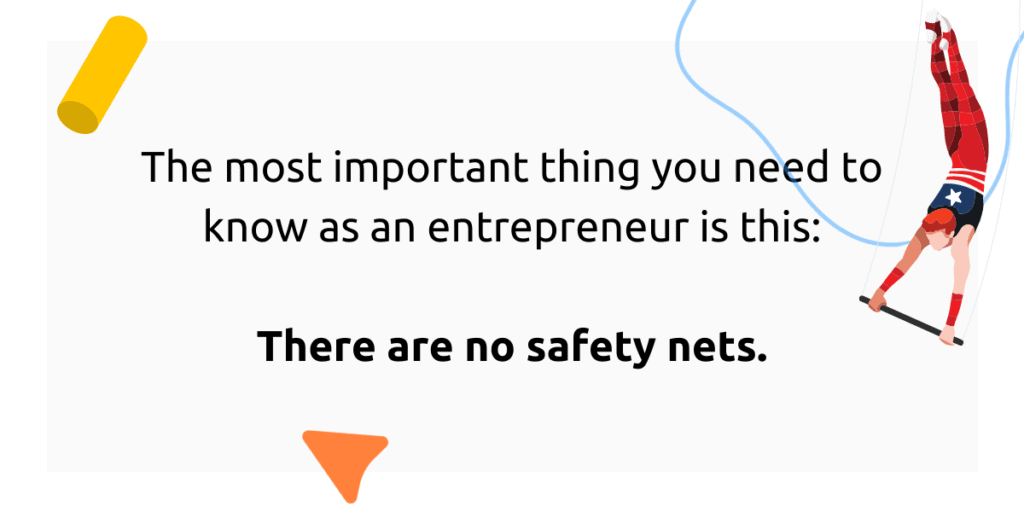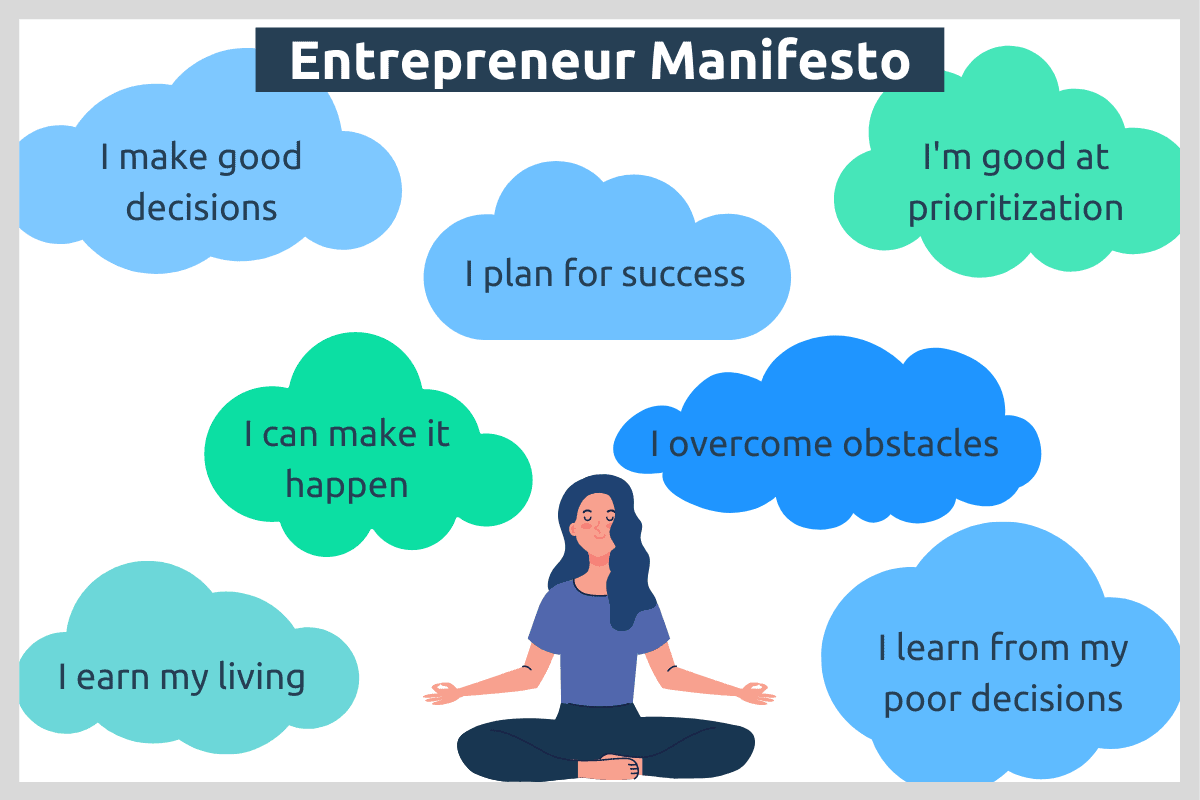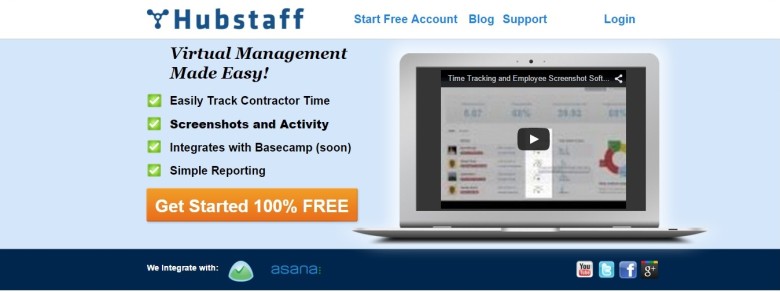Starting a business is exciting. You’re passionate. You believe in your vision and you’re ready to put in the work to make it a reality.
But for every startup that makes it, nine others failed.
That’s because creating a successful startup is grueling work. Many successful founders aren’t successful on their first try. I’ve had my share of failures, which gave me the experience I needed to create Hubstaff.
I learned a few things the hard way in 12+ years of running and managing a remote startup. You need to cultivate a tough entrepreneurial mindset and a unique set of skills to survive launching, leading, and sometimes burying a startup.
For every startup that makes it, there are nine more that failed.
The job tests my skills every day. This article will cover some of the challenges I’ve faced starting and growing Hubstaff. Conquering these setbacks shaped my entrepreneurial mindset beyond what I expected, and now I’m passing the lessons on to you.
Boost your team’s efficiency with Hubstaff's productivity tools
Try it free for 14 daysWhat does it mean to be an entrepreneur?
People have different ideas about what it means to be an entrepreneur. People who have never started a business can have a wildly distorted view of the actual entrepreneur lifestyle.
Jared and I recorded this interview to share some of our most valuable insights. Check it out. It gives a lot of context to the things I discuss in this article.
Here are the most important things you need to realize about being an entrepreneur:
There are no safety nets
Entrepreneurs do not have the luxury of being risk-averse. When you are part of someone else’s team, you have a clear direction, work boundaries, and some financial security.

Typically, employees will have a supervisor and maybe even someone above the supervisor to whom they can turn for help when facing challenges. Someone will always be there to tell a team member what to work on, for the most part.
Employees have clear work boundaries and a steady paycheck. In the morning, they clock in, and at the end of the day, they can clock out and leave stress at work. Their paycheck almost never depends on the company’s revenue or expenses, and payday is scheduled so you know when the check is coming.
When you’re an entrepreneur, you don’t have any of that, which means you need to learn to be okay with risk.
Employees have boundaries, bosses, and a steady paycheck. Entrepreneurs don’t.
On top of that, it’s your job to create some security for your team. You have to send out paychecks even if you don’t make your own money this week. The risk is 100% your responsibility.
With great responsibility comes…even more responsibility
Founders are in charge of their business, so there’s no one there to tell them what to do next.
Entrepreneurs can’t afford to waste any time. Every hour you spend on a low-priority task is an hour that you’re not getting the most important things done. Figuring out your priorities is key. There will never be enough time to do everything you want to, so you must decide which things you’re not going to do.

Entrepreneurs don’t clock out at the end of the day and forget about work. There’s no such thing as “off the clock” when you’re the founder.
Learn to balance work and personal life when the lines between “at work” and “at home” get blurred. Don’t neglect your family life and your health; you need both of those things to be in good shape to work at peak efficiency. At the same time, you might have to sacrifice some of your personal time to keep your business running.
When you’re the founder, nobody is going to tell you how to do your job. It’s up to you to figure out the best and most efficient way to do things. An entrepreneur should constantly look for better ways to work.
Looking for a better way to manage your remote team?
Get our free No Excuses Ebook and find a better way to work today.
You need to learn quickly or fall on your face
Once you’ve got your startup going and growing, you’ll have to learn on the go, even if you know everything there is to know about your product.
Entrepreneurs never stop learning.
There’s a lot to learn about running a company. For example, as your team expands, you must learn about talent management.
When your first customer complaint comes in, you learn about issue resolution.
If you need a new project management software to manage time and tasks, you have to research your options and choose the best fit for your team.
You must learn quickly or face the consequences.
Being a founder is hard because you learn through experience, and that experience is often failure. A major part of an entrepreneurial mindset is looking at every day as an opportunity to learn something new.

Working on your own entrepreneurial mindset? Subscribe to the Hubstaff blog to get tips on management, growth, and how to think like a founder.
What is an entrepreneurial mindset?
An entrepreneurial mindset means you automatically think like a business owner. People with this mindset are highly optimistic and believe in their ability to succeed. They’re focused on their business and the opportunities that are available to them.
Entrepreneurs are solution-oriented and understand that there’s at least one solution to every problem. They either learn how to fix a problem themselves or hire someone who can do it.
Building a business is hard work. Fundera reports that 70% of entrepreneurs work more than 40 hours per week, and 19% work more than 60 hours per week.
It’s risky, too. According to the U.S. Bureau of Labor Statistics, 45% of new businesses fail during the first five years.
Having the right mindset can be just as important as your business strategy. It will help you to keep working hard and stay optimistic even when faced with failure.

7 signs that you have an entrepreneurial mindset
Every entrepreneur is different, but successful founders still have a lot in common. If you can relate to these seven characteristics, you’re on the right track.
1. Drive
As a founder, no one will make you go to work at 6 a.m. or even 11 a.m.
You have to want your company to succeed and be willing to put time and effort into it. No one else is pressuring you to make the next move for company growth.
Generally, if your focus is money, your business will fail. You need to have the drive and desire for something more. There are lots of easier ways to make money.
2. Focus
Many people can’t focus on what matters. They let distractions interrupt their thought processes or allow other people to force their schedules upon them.

Founders should create their own schedules. Focus on your core company strategy and let everything else go.
Focus is closely related to follow through. Instead of bouncing from project to project, successful entrepreneurs stick with one thing until it’s finished, then move on to the next priority. You might have to balance multiple priorities, but focused founders don’t let things slip when they get distracted.
3. Decisiveness
It’s hard to tell if a decision was good or bad immediately after making it. Founders need to overcome doubts and hesitations to make a decision, even in the face of uncertainty.
Sometimes, things play out and you know which decisions were right and which were less productive. But that’s not always the case. You might never know if you made the best choice. That’s why entrepreneurs must be comfortable with some uncertainty.
Even if you’re not sure what the best option is, failing to make a decision at all is never the right choice. Decisiveness means that you make the choice and then own it, even if you’re not sure.
4. Independence
Founders must be okay with being alone at work.

In general, a founder will push harder than anyone else on his or her team and has to be comfortable putting in the extra work alone. You can’t rely on someone else for success. If you want something, you have to take the initiative to go out and make it happen.
Like I’ve said throughout this whole article, there’s nobody looking over your shoulder making sure you do what you should. An entrepreneur can’t afford to wait for someone else’s opinion or approval before taking action.
5. Genuineness
Founders genuinely take pride in their craft and product.
When you think about what you and your team built, there should be a sense of accomplishment and a certainty that your product is of high quality. If you don’t care about what you’re offering to others, your customers will feel that. It shows in your culture and your product.
People who are genuine have integrity because the way they talk lines up with the way they act. This is crucial for startup founders who want to grow a successful company. You can’t fake it.

6. Flexibility
Entrepreneurs must be comfortable handling multiple facets of a company. Successful founders can’t afford to be too rigid.
You may have to set up the books, manage sales, contact developers, handle customer support, speak with customers, manage the product, and more. To be a successful leader, you need a diverse set of skills and the flexibility to play different roles.
7. Product and market understanding
The most common reason that startups fail is because there’s no market need for their product. Passion alone won’t grow a business. The world needs to want what you sell.
A founder needs the ability to understand what the market needs and wants. Then, they need to know how to build a product to satisfy that need.
You should have skills within your industry or at least plan to get them. Don’t go by gut feelings here. Put in the work to do market research and really understand your potential customers.
How to develop an entrepreneurial mindset
If you think your mindset is holding you back, work on it.
Here’s how to develop an entrepreneurial mindset.
Find your why
The first step to developing an entrepreneurial mindset is to understand why you want to be an entrepreneur in the first place. Is it to make money, solve a problem, or make the world a better place? Maybe it’s multiple of those things or something else entirely.
No one can answer this for you. This is one question you need to answer for yourself.
Use these questions to help you:
- What inspired your business idea?
- What’s unique about your business?
- How has your business evolved over the years?
- Does your business support a specific cause?
Knowing why you want to be an entrepreneur will help you when you feel lost or lack the motivation to keep going.
Protect your time

Have you ever started your day with half a dozen items on your to-do list, confident that you’ll be able to complete all of them, but by the end of the day, you only cross one thing off the list?
Successful entrepreneurs get so much done because they manage their time ruthlessly.
There are too many opportunities and your time is limited. Don’t spread yourself too thin.
Figure out how much time you really have in a week. Are you working on your business full-time, or is it a side gig that you’re building after-hours? Be realistic about how many hours per week you can dedicate to working on your business.
Then, think about what’s necessary for growth. Create a list of goals and then split each goal into a series of tasks. Write down every task, no matter how small. Those little things can derail your day.
Add these tasks to your to-do list and keep the list on you at all times. I use a task management tool for this so I can log in and see what’s on my plate any time, anywhere.
The key here is to understand which tasks you should focus on and which you should delegate or just skip.
You can categorize your tasks as follows:
- Urgent and important – Do these immediately.
- Not urgent but important – Schedule a time on your calendar to work on these tasks.
- Urgent but not important – Delegate these to someone else.
- Neither urgent nor important – Consider deleting these tasks from your to-do list.
Once you know which tasks you should focus on, try to estimate how long each one will take to complete. Split your day into 30-minute time blocks and then assign as many blocks as needed for each task.
Remember to leave some time for unexpected tasks that might come up now and then, but don’t lose focus. It’s okay to let your messages sit unread for a few hours or even a couple of days when you’re working on a top priority. You can sort and schedule those new to-dos later.
Learn to manage your time, grow your team, and more.
Get the free No Excuses Ebook here.
Understand your strengths and weaknesses
Self-awareness is a crucial entrepreneurial trait. You need to know what you’re good at so you can capitalize on it and understand what you’re bad at so that you can find partners or team members to address your weaknesses.
To understand your strengths, think about what tasks you’re good at doing. What do other people say when they compliment you? Where do you get the best results with the least effort? These are your strengths.
Then, try to think of tasks you usually ask other people to help you with. These are probably related to your weaknesses.
It’s hard to be objective about these kinds of things, and everyone has blind spots. You can ask your current or former coworkers, friends, and family for their opinion. Make it clear that they can be honest with you without hurting your feelings, or they might hold back.
Make decisions quickly
As an entrepreneur, you make important business decisions every day.
You should be comfortable making decisions quickly. If you hesitate for too long, you risk missing an opportunity.
Here’s how to speed up your decision-making process:
- Don’t be a perfectionist – Spending too much time analyzing a situation usually happens because you’re afraid of making the wrong decision. Come to terms with the fact that you’ll make mistakes from time to time.
- Set a time limit – A great way to prevent overanalyzing a decision is to limit the amount of time you spend thinking about it. Give yourself a hard deadline for making a decision.
- Seek out expert advice – You don’t have to do everything by yourself. If you feel like you lack the knowledge to make the right decision, find an expert to help you.
Stop being afraid of failure
You’ll fail a lot throughout your entrepreneurial journey. Don’t be ashamed of setbacks. Look at every failure as a learning opportunity, not a judgment on your skill as a founder. If you’re not failing, you’re probably not doing anything.
Here’s how to stop being afraid of failure:
- List all potential outcomes – Your fear of failure might stem from the fact that you don’t know what could happen if you fail. Address this by listing all the potential outcomes of doing what you’re planning to do. Use this exercise to help you get over the fear; eventually, you shouldn’t need this anymore.
- Figure out where your fear of failure comes from – You might fear failure because of an inherent lack of confidence, a childhood trauma, or something else. Find out where your fear stems from, and then deal with the underlying cause.
- Reframe how you think about your goal – Having an all-or-nothing mentality can increase your fear of failure. Instead of dealing in absolutes — you failed, or you succeeded — learn something in the process.
- Practice positive thinking – Think back at your previous failures. Can you think of anything positive about them? These insights are hard-won. Don’t waste your failures because you feel sorry for yourself.
Always look for networking opportunities
Networking allows you to stay on top of industry trends, meet potential business partners, and open up different opportunities for your business. As an entrepreneur, you should constantly be on the lookout for networking opportunities.
Here are a few ideas:
- Attend industry conferences – You don’t want to miss out on events where you can learn new things and meet other founders, right? Invest in a few conferences every year. Get more out of them by planning your visit.
- Join mastermind groups – A mastermind group is a bunch of people with a common goal. They can meet online or in person to share their thoughts and ideas and get feedback. Look for existing mastermind groups in your area through websites such as Meetup.com or create one yourself.
- Seek out online communities – There are plenty of places online where entrepreneurs and industry professionals discuss topics that would be of interest to you. Facebook groups, LinkedIn groups, and Reddit subreddits are good places to start if you want to join one of these communities.
Never stop learning
As an entrepreneur, you need to constantly learn new things. Continual learning broadens your horizons and helps you identify new opportunities for your business.
Learning also keeps you relevant. The world changes fast, and it’s easy to get left behind.
Here are a few ways you can stay on top of developments in your industry:
- Visit industry websites regularly – Whichever industry you’re in, there are bound to be some great websites dedicated to it. Find these and then visit them regularly to stay on top of industry news.
- Be on the lookout for case studies – Other businesses in your industry might be publishing case studies or reports about their business or their customers. Set up Google Alerts to get notifications when these types of case studies are published.
- Sign up for online courses – There’s an online course for everything these days. If you’ve already made a list of your weaknesses, look for online courses that can help you address them.
- Find industry podcasts – The podcast is one of the most popular content formats today. That’s why so many experts start podcasts to discuss topics that interest them and their target audience. You can probably find a handful of podcasts that relate to your industry, and there are lots that talk about entrepreneurship and business ownership in general.
The Hubstaff blog is a powerful tool for entrepreneurs who take their growth seriously. Subscribe and get the best articles and expert advice sent straight to your inbox every month.
The Entrepreneur Manifesto

If you want to be an entrepreneur for the long haul, these are your motivators. These things get you up in the morning, ready and eager to do a good job no matter how you’re feeling:
- I must earn my living – If you’re a founder, no one will give you money. You have to earn it. You earn it by creating more value for the market than you are asking for in return. Value creation is complex and takes creativity and ingenuity.
- I must plan my success – No one will tell you what to do each day. It’s entirely up to you. Some people enjoy this aspect of being a founder, and others hate it. Love it or not, it’s up to you to build a plan and execute it.
- I can make good decisions – There are 1,000 decisions that you need to make every day as a founder. Your choices determine the success of your company, which ultimately determines your success as a founder.
- I must prioritize my tasks – You need to know which tasks are worthwhile, which ones have the most potential to pay off, and which ones will waste your time.
- I must learn from my bad decisions – Most people are not okay with failure. It’s hard not to take failure personally. I’ve had more failures than successes, but my failures often lead to my successes. I fail every single day, multiple times. More than 90 percent of businesses fail for a reason, and it’s hard. But it’s something you have to learn from if you want to succeed.
- I can overcome obstacles – There are going to be problems in any business. You have to be okay with fires, and you have to know how to deal with them. Fires do arise, and when they do, you must get through them and continue building your business.
- I can make it happen – The best entrepreneurs are doers. They understand the value of execution and will get things done when they need to be. Strategy and planning are necessary, but execution is where it all comes together to make something that counts.
Am I doing this right?
You will always wonder whether you’re on the right track. At some point, and in my case multiple points daily, entrepreneurs ask themselves:
Am I doing this right?
And sometimes, the internal monologue sounds like this:
Is this the best decision I could have made? Should I have worked harder to close that client? Do I have the right set of entrepreneurial skills to make it? Should I have hired that second customer support person? Should I make my product available in a different language?
The fact of the matter is, there is no 100% right or wrong way to be a founder. Sometimes, that’s a pain point because you can never be sure of what you’re doing. I’m constantly asking myself whether I’m “doing it right.”
That is the sign of an excellent entrepreneurial mindset because it means you’ll never stop growing and learning. It’s stressful, but necessary.
The bottom line
I’ve found that being a successful founder comes down to desire and confidence. When you’re a founder, you have the desire to reach the end goal more than anything else in your life.
To be successful, you need to have confidence that you are making the right decisions for your company. Then, you must execute those decisions.
In the end, despite all the challenges and uncertainty, there’s nothing I’d rather do than be an entrepreneur.
What about you?
What important entrepreneurial traits or skills did we miss? What challenges do you face as a founder, and what skills do you think are valuable for success?
Let us know in the comments.
Get more articles like this when you subscribe to the Hubstaff blog.
This post was originally published in August 2015. It was updated in May 2021.
Most popular
How to Calculate a Raise: Practical Guide for Employers
By 2030, the US alone will lose $430 billion annually due to low talent retention — and a lot of this turnover stems from low pa...
How to Survive and Thrive in an 80-Hour Work Week
It’s hard to believe that only a century ago, the 80-hour work week was the norm in the United States. Then, in 1926, the Ford M...
Mastering Workforce Scheduling: Techniques and Tools for Success
Imagine a workday where scheduling your workforce effectively ensures that every shift is perfectly aligned with your business nee...
Top Time Trackers for Virtual Assistants: Enhance Efficiency and Accountability
Virtual assistants (VAs) have a lot of responsibilities — and so do the people who hire them. With so much to keep track of, a t...





